Balance of power and nuclearisation of South Asia
The balance of power theory is in fact as old as history.

The writer is a retired lieutenant general of Pakistan Army and currently a member of the Senate of Pakistan
Firstly, by building war potential and upgrading combat worthiness both in conventional and non-conventional spheres. This could be symmetrical through visual power potential or asymmetrical including psychological factor also. Secondly, by aligning itself with other threatened states like when the Warsaw Pact bloc was formed up. Thirdly, the worst option available to weaker states is to guard their existence by aligning with stronger powers even if these are aggressors. This is called bandwagoning which states are forced to resort to at times against their conscience when it is felt that the cost of confrontation with stronger powers will be much more than the benefits. Pakistan unfortunately had to adopt this option when the Americans invaded Afghanistan and extracted Pakistani cooperation at gunpoint with a clear warning that “you are with or against us” and that in case of non-cooperation you could be pushed to the stone age.
The balance of power theory is in fact as old as history. It was considered essential to maintain peace and was first applied by the Greek civilisation. European countries however could not maintain the balance of power and remained engaged in religious wars for 30 years. These wars ended in 1648 when the Westphalia peace treaties were signed in which 109 delegates participated at different times in different pacts. This was the beginning of the modern international system where sovereignty of states was to be respected. However thereafter we unfortunately saw the Napoleonic wars, First and Second World Wars, the Korean conflict and Gulf wars. This totally destroyed the concept of universalism which had emerged to encourage greater politico economic relations among sovereign nations without any external pressures or coercion of any type. Resultantly, the League of Nations failed and now we are witnessing the near demise of the United Nations.
In South Asia, in view of Indian refusal to honour UN resolutions on Kashmir and its reluctance to reconcile with the reality of Pakistan because of her hegemonic designs, it was essential to maintain a balance of power to protect our sovereignty and defend the territorial integrity of our country right from Pakistan’s inception. Pakistan therefore, had no choice but to initially join SEATO and CENTO, align with the US in the 50s, and with China and the Organisation of Islamic Cooperation in the 60s, while India on the other hand derived strength from non-aligned forums and later aligned with the Soviet Union and now it has secured strategic partnership with the US. Present Indian government under Modi actually believes in the Akhand Bharat concept including amalgamation of all SAARC countries and control of the sea lines of communications from the Strait of Malacca to the Strait of Hormuz in the Indian Ocean and Arabian Sea. This concept was propounded by Chanakya, the adviser to emperor Chandra Gupta Maurya, about 2,300 years ago.
When India created an imbalance by amassing billions of dollars worth of conventional arms, aggressed into former East Pakistan in 1971, and finally had the audacity to undertake nuclear explosions in 1974 with impunity, Pakistan had no choice but to take essential measures to rectify this sudden disturbing distortion in the existing balance of power to allay the looming danger to our national security. The Indian military leadership thereafter came up with the Cold Start Doctrine to exploit our limited depth, proximity of our strategic road-rail communications and population centres to our eastern borders. This was immediately responded by Pakistan through development of tactical nuclear weapons.
It will, therefore, be very fair to conclude that all civil and military rulers in Pakistan played their very effective role to lift Pakistan’s defence capability to ensure the balance of power in South Asia since 1947. The initiation of the nuclear programme and its pursuit with desired vigour by all was no doubt very important to create a credible deterrence. In fact the Fall of Dhaka necessitated this. Visionary leaders of the calibre of ZA Butto initiated the project and all rulers from 1974 onwards pursued it with desired devotion, sincerity and secrecy. The crucial role was however played by the scientists, our military leadership and many unsung heroes.
The bomb was ready by the late 80s but for its international declaration and explosion, Pakistan had to wait for over one decade because of international pressures. Indian arrogance on the other hand created a golden opportunity when they conducted five explosions on May 11, 1998, which was responded by undertaking six explosions by Pakistan’s democratic leadership of PML-N under prime minister Mian Muhammad Nawaz Sharif on May 28, despite all external pressures and threats of economic sanctions. All politicians, service chiefs, diplomats, media magnets and scientists who gave positive or negative recommendations in the national interest deserve commendations. However, prime minister Nawaz Sharif took the final political decision taking full responsibility on his shoulders for any success or failure. That feather cannot be removed from his cap. Besides such a bold decision can only be taken by a democratic leader who is answerable to the Parliament and the people of Pakistan and not by any dictator who thrives not on public support but foreign guarantees for his rule.
It is now indeed very satisfying to note that nuclear Pakistan has created a strategic balance of power in South Asia through a very potent nuclear deterrence but it is also important at the same time to comprehend that defence potential of a state alone cannot ensure foolproof national security. There are other equally, if not more, important factors like national unity, internal cohesion, prospering economy, political stability, towering political leadership and proactive aggressive foreign policy which play a pivotal role. Unfortunately, at present we see a dismal performance in all these areas. We, therefore, need to pay attention to these factors jointly as a nation. The sitting Prime Minister has to take this initiative and lead the nation from the front.
Published in The Express Tribune, June 5th, 2020.
Like Opinion & Editorial on Facebook, follow @ETOpEd on Twitter to receive all updates on all our daily pieces.













COMMENTS
Comments are moderated and generally will be posted if they are on-topic and not abusive.
For more information, please see our Comments FAQ